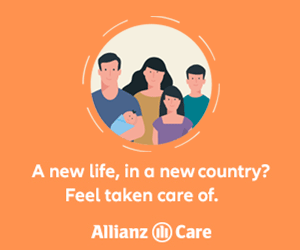Expat New York: 10 Tips for Living in New York City
Expats in New York City will quickly find that New Yorkers defy their stereotypes. New York is a melting pot of people from every corner of the globe and every income level -- all brought together by the city's subway system. Some expats enjoy living right in the hustle and bustle of the city. Others choose to enjoy a bit more greenery and space in a suburb on New York.
Please login to continue reading this article.
Not a member? Join Today (it's free).
About the Author
 Joshua Wood, LPC joined Expat Exchange in 2000 and serves as one of its Co-Presidents. He is also one of the Founders of Digital Nomad Exchange. Prior to Expat Exchange, Joshua worked for NBC Cable (MSNBC and CNBC
Primetime). Joshua has a BA from Syracuse and a Master's in Clinical and Counseling Psychology from Fairleigh Dickinson University. Mr. Wood is also a licensed counselor and psychotherapist.
Joshua Wood, LPC joined Expat Exchange in 2000 and serves as one of its Co-Presidents. He is also one of the Founders of Digital Nomad Exchange. Prior to Expat Exchange, Joshua worked for NBC Cable (MSNBC and CNBC
Primetime). Joshua has a BA from Syracuse and a Master's in Clinical and Counseling Psychology from Fairleigh Dickinson University. Mr. Wood is also a licensed counselor and psychotherapist.
Some of Joshua's articles include Pros and Cons of Living in Portugal, 10 Best Places to Live in Ireland and Pros and Cons of Living in Uruguay. Connect with Joshua on LinkedIn.
Additional Information:
- 7 Tips for Living in New York
- Pros & Cons of Living in New York
- Driving in New York
- Cost of Living in New York
- Health Care in New York
- The Essential Guide to New York
- Health Care in New York City
- 10 Best Places to Live in New York City
- 10 Tips for Living in New York City
- Healthcare & Health Insurance in United States
- Best Places to Live in United States
- Real Estate in United States
- Pros & Cons of Living in United States
- Moving to the USA
- What It's Like Living in New York
- Pros and Cons of Living in United States 2024
- 2024 Guide to Moving to United States
Comments
TerenehMosleyAs a New Yorker who is now traveling, it was fun to read this article. I think Mr Wood has it spot on and on point with his advice. I would add that though New Yorkers can be guarded at times, they can melt like butter, so a smile goes a long way. Also be prepared for big city Ups and Downs. NY can reward the ones who put in effort but she can also kick you when you're down, so develop a hard skin and go for it. Living in NY is wonderful, enjoy it, you're living in one of the world's greatest cities.
guestI found this article very helpful! Thank you. I moved to NYC a few years back and I wish I could had access to this information at the time. One recommendation I can give is using Furnishr.com for your move. They are a New York based interior design service that will help you pick a custom look and provide you with one day installation and set up!

 New York, The United States
New York, The United States


